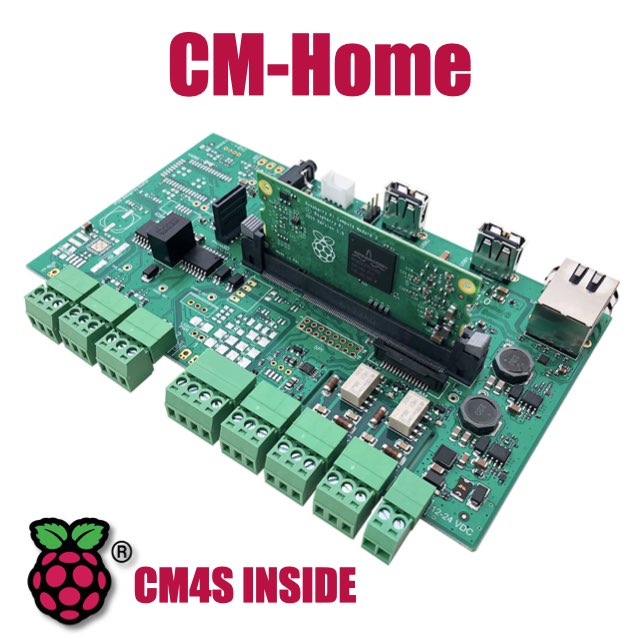CM Panel technical documentation Buy
Install the advanced utilities
Setting the Real Time Clock
$ sudo apt-get -y remove fake-hwclock
$ sudo update-rc.d -f fake-hwclock remove
$ sudo systemctl disable fake-hwclock
Edit file /lib/udev/hwclock-set:
$ sudo nano /lib/udev/hwclock-set
and comment line:
#!/bin/sh
# Reset the System Clock to UTC if the hardware clock from which it
# was copied by the kernel was in localtime.
dev=$1
#if [ -e /run/systemd/system ] ; then
# exit 0
#fi
Edit the file /etc/modules
$ sudo nano /etc/modules
with these contents:
# /etc/modules: kernel modules to load at boot time.
#
# This file contains the names of kernel modules that should be loaded
# at boot time, one per line. Lines beginning with "#" are ignored.
i2c-dev
rtc-8523
Edit file /etc/rc.local:
$ sudo nano /etc/rc.local
Insert this line before the exit 0 istruction:
# PCF8523
echo pcf8523 0x68 > /sys/class/i2c-adapter/i2c-1/new_device
then reboot by typing:
$ sudo reboot
Now run command:
$ sudo i2cdetect -y 1
0 1 2 3 4 5 6 7 8 9 a b c d e f
00: -- -- -- -- -- -- -- -- -- -- -- -- --
10: -- -- -- -- -- -- -- -- -- -- -- -- -- -- -- --
20: -- -- -- -- -- -- -- -- -- -- -- -- -- -- -- --
30: -- -- -- -- -- -- -- -- -- -- -- -- -- -- -- --
40: -- -- -- -- -- -- -- -- -- -- -- -- -- UU -- --
50: -- -- -- -- -- -- -- -- -- -- -- -- -- UU -- --
60: -- -- -- -- -- -- -- -- UU -- -- -- -- -- -- --
70: -- -- -- -- -- -- -- --
Address 0x68 is Real Time Clock
Create a directory /home/pi/app:
$ mkdir /home/pi/app
Create the file /home/pi/app/goshd.py with these contents:
#!/usr/bin/python
import RPi.GPIO as GPIO
import time
import datetime
import os
O_DISPLAY =22
I_SHD =25
GPIO.setmode(GPIO.BCM)
GPIO.setwarnings(False)
GPIO.setup(I_SHD,GPIO.IN)
GPIO.setup(O_DISPLAY,GPIO.OUT)
while True:
if GPIO.input(I_SHD) == 1:
GPIO.output(O_DISPLAY,GPIO.HIGH) # Display Off
os.system("sudo shutdown -h -P now")
time.sleep(.5)
Set it as executable class='acmetable':
$ chmod +x /home/pi/app/goshd.py
Create a service by editing this file:
$ sudo nano /etc/systemd/system/goshdn.service
Save in it these contents:
[Unit]
Description=Set Auto shutdown
After=systemd-user-sessions.service
[Service]
ExecStart=/home/pi/app/goshd.py
Restart=on-abort
User=root
WorkingDirectory=/home/pi/app
[Install]
WantedBy=multi-user.target
Then enable the service by typing:
$ sudo systemctl daemon-reload
$ sudo systemctl enable goshdn.service
Create the file /home/pi/app/cm3start.py with these contents:
#!/usr/bin/python
import RPi.GPIO as GPIO
import time
import os
SHDNDONE = 26
GPIO.setmode(GPIO.BCM)
GPIO.setwarnings(False)
GPIO.setup(SHDNDONE,GPIO.OUT)
# On CM3 (Send message OK to Microcontroller )
GPIO.output(SHDNDONE,GPIO.LOW)
# Set Register RTC
time.sleep(1)
os.system("sudo i2cset -y -f 1 0x68 0x00 0x58")
time.sleep(1)
os.system("sudo i2cset -y -f 1 0x68 0x0f 0xff")
time.sleep(1)
os.system("sudo hwclock -s")
Set it as executable class='acmetable':
$ chmod +x cm3start.py
Create a systemd file for this service:
$ sudo nano /etc/systemd/system/cm3start.service
with this content:
[Unit]
Description=CPU to microcontroller to start regular operating system
After=systemd-user-sessions.service
[Service]
ExecStart=/home/pi/app/cm3start.py
Restart=on-abort
User=root
WorkingDirectory=/home/pi/app
[Install]
WantedBy=multi-user.target
Then enable the service by typing:
$ sudo systemctl daemon-reload
$ sudo systemctl enable cm3start.service
$ sudo halt
Now Remove Jumper BYPASS
Insert Jumper to Supercap CHK
Power on board and wait charge supercap.
When the Board has been started and the operating system has been started up regulary, disconnect the board from the power supply. The same will turn off automatically the shutdown.
Now the Power Safe is activated. !!!
Create python script set_alarm.py (Interrupt RTC)
$ sudo raspi-config
Examples:
Set Localisation Options, L2 Timezone, Europe and Rome.
This will be used for example to set the board to switch on at a set time (MANUAL mode) at a set time through the Interrupt Real Time Clock chip.
Python Script for setting interrupt.
$ nano /home/pi/app/set_alarm.py
Contents:
#!/usr/bin/python
'''
===============================================================================
Description : Set PCF8523 Alarm interrupt - Minute or Time
Board : CM3-Panel V.7 POE - Acme Systems
Autror : Mauro Tocci
Version : 1.1 - October 2019
-------------------------------------------------------------------------------
Use example :
-------------------------------------------------------------------------------
script.py 12:15 M N N
script.py 12:15 T N N
| | |_ Y = Debug enable (Y only screen, no transfer to the chip)
| |
| |___ Y = Sync NTP server
|
|_____ M = Switching on only when the minutes indicate value 15
|_____ T = Start-up time 12:15
-------------------------------------------------------------------------------
Logic sequence:
Time alarm example: 14:30
1. Split time value to array (variable dato[x])
2. Hour calculation (dato[0]) to time UTC
3. Calculation of hexadecimal values to be set on the RTC registers
Hour alarm register (address 0Bh)
Hour
__12__ <--- UTC value
| |
DEC UNIT
7654 3210 Bit registry
0001 0010 Binary
|______|
| <- Concatenate
00010010 BCD to hex convert
|
0x12 Hexadecimal value
|
sudo i2cset -f -y 0x68 0x0b 0x12 Set Hour Alarm registry
Minute alarm register (address 0Ah)
Minute
__30__
| |
DEC UNIT
7654 3210 Bit registry
0011 0000 Binary
|______|
| <- Concatenate
00110000 BCD to hex convert
|
0x30 Hexadecimal value
|
sudo i2cset -f -y 0x68 0x0a 0x30 Set Minute Alarm registry
4. Send final sequence data to RTC
sudo ntpdate ntp1.inrim.it # Example Sync Italian NTP Server (Y)
sudo hwclock -w # Set clock hardware (Y)
sudo i2cset -f -y 0x68 0x00 0x58 # Reset chip PC8523"
sudo i2cset -f -y 0x68 0x00 0x02 # AIE Enable alarm INT1
sudo i2cset -f -y 0x68 0x0f 0xff # INT1 Off - mosfet open drain
sudo i2cset -f -y 0x68 0x0a 0x30 # Set Minute Alarm registry
sudo i2cset -f -y 0x68 0x0b 0x12 # Set Hour Alarm registry
===============================================================================
'''
import os
import sys
import datetime
from datetime import timedelta
#----------------------------------------------------------------------
# Conversion from decimal to binary
#----------------------------------------------------------------------
def bcddigit(sn,dgt):
n = int(sn)
bin_nr = bin(n)[2:]
return (('0' * dgt ) + bin_nr)[-dgt:]
#----------------------------------------------------------------------
# Clear
#----------------------------------------------------------------------
def cls():
os.system('cls' if os.name=='nt' else 'clear')
try:
#----------------------------------------------------------------------
# Variables sets
#----------------------------------------------------------------------
dato = sys.argv[1].split(':') # Array hour
TYP = sys.argv[2] # Type of writing
Sync = sys.argv[3] # Sync to NTP server
Debug = sys.argv[4] # Debug screen print value
#----------------------------------------------------------------------
# Data preparation to be transferred to the chip
#----------------------------------------------------------------------
cls()
delta = 0
ACTH = dato[0] # Hour
ACTM = dato[1] # Minute
# UTC
utc_h = datetime.datetime.utcnow()
# Local time
dat_h = datetime.datetime.now()
# I find the difference between local time and UTC
if ( utc_h < dat_h ):
delta = (int(dat_h.strftime("%H")) - int(utc_h.strftime("%H"))) *-1
#----------------------------------------------------------------------
# UTC Calculate
#----------------------------------------------------------------------
utc_h = datetime.datetime.now().strftime("%Y-%m-%d " + dato[0] + ":" + dato[1])
utc_h = datetime.datetime.strptime(utc_h, '%Y-%m-%d %H:%M')
utc_h = utc_h + timedelta(hours=delta)
dato = utc_h.strftime("%H:%M").split(':') # Calculated time
D = 4
BIN_D = "" # Decimal
BIN_U = "" # Unit
reg_0a = "" # Minute Register
reg_0b = "" # Hour Register
if ( Debug == 'Y' ):
print "==================================================================="
print " List of data entered and register calculation"
print "==================================================================="
print "Time : " + sys.argv[1]
print "Type : " + TYP
print "Sync NTP : " + Sync
print "Calc UTC : " + repr(delta) + " hours compared to Local Time"
if ( TYP == 'T' ):
if ( Debug == 'Y' ):
print ""
print "-----------------"
print " HOURS"
print "-----------------"
print " Value : " + ACTH
print " UTC calculation : " + dato[0]
print ""
print " Ten's place : " + dato[0][:1]
BIN_D = bcddigit(dato[0][:1],D)
if ( Debug == 'Y' ):
print " Binary : " + BIN_D
print " HEX : " + hex(int(BIN_D,2)).replace("0x", "0x0")
print ""
print " Unit place : " + dato[0][1:]
BIN_U = bcddigit(dato[0][1:],D)
if ( Debug == 'Y' ):
print " Binary : " + BIN_U
print " HEX : " + hex(int(BIN_U,2)).replace("0x", "0x0")
print ""
print " Bit registry : 76543210 - AEN_H = 7 (0 = Enable, default 1)"
print " Binary : " + BIN_D + BIN_U
BIN = BIN_D + BIN_U
if ( int(BIN,2) < 16 ):
reg_0b = hex(int(BIN,2)).replace("0x", "0x0")
if ( Debug == 'Y' ):
print " HEX Reg. 0Bh : " + reg_0b
else:
reg_0b = hex(int(BIN,2))
if ( Debug == 'Y' ):
print " HEX Reg. 0Bh : " + reg_0b
if ( Debug == 'Y' ):
print ""
print "-----------------"
print " MINUTES"
print "-----------------"
print " Value : " + ACTM
print ""
print " Ten's place : " + dato[1][:1]
BIN_D = bcddigit(dato[1][:1],D)
if ( Debug == 'Y' ):
print " Binary : " + BIN_D
print " HEX : " + hex(int(BIN_D,2)).replace("0x", "0x0")
print ""
print " Unit place : " + dato[1][1:]
BIN_U = bcddigit(dato[1][1:],D)
if ( Debug == 'Y' ):
print " Binary : " + BIN_U
print " HEX : " + hex(int(BIN_U,2)).replace("0x", "0x0")
print ""
print " Bit registry : 76543210 - AEN_M = 7 (0 = Enable, default 1)"
print " Binary : " + BIN_D + BIN_U
BIN = BIN_D + BIN_U
if ( int(BIN,2) < 16 ):
reg_0a = hex(int(BIN,2)).replace("0x", "0x0")
if ( Debug == 'Y' ):
print " HEX Reg. 0Ah : " + reg_0a
else:
reg_0a = hex(int(BIN,2))
if ( Debug == 'Y' ):
print " HEX Reg. 0Ah : " + reg_0a
if ( Debug == 'Y' ):
print ""
print "-------------------------------------------------------------------"
print " Set registry PCF8523"
print "-------------------------------------------------------------------"
if ( Sync == 'Y' ):
print "sudo ntpdate ntp1.inrim.it" + " # Sync NTP Server Italiano"
print "sudo hwclock -w" + " # Set clock hardware"
print "sudo i2cset .y -f 1 0x68 0x00 0x58" + " # Reset chip PC8523"
print "sudo i2cset -y -f 1 0x68 0x00 0x02" + " # AIE Enable alarm INT1"
print "sudo i2cset -y -f 1 0x68 0x0f 0xff" + " # INT1 Off"
if ( TYP == 'T' ):
print "sudo i2cset -y -f 1 0x68 0x0b " + reg_0b + " # Set Hour register"
print "sudo i2cset -y -f 1 0x68 0x0a " + reg_0a + " # Set Minute register"
print ""
if ( Debug == 'N' ):
if ( Sync == 'Y' ):
x=os.system("sudo ntpdate ntp1.inrim.it")
x=os.system("sudo hwclock -w")
os.system("sudo i2cset -y -f 1 0x68 0x00 0x58")
os.system("sudo i2cset -y -f 1 0x68 0x00 0x02")
os.system("sudo i2cset -y -f 1 0x68 0x0f 0xff")
if ( TYP == 'T' ):
os.system("sudo i2cset -y -f 1 0x68 0x0b " + reg_0b + "")
os.system("sudo i2cset -y -f 1 0x68 0x0a " + reg_0a + "")
except IndexError as e:
cls()
print "---------------------------------------------------------------------------------------"
print " Error insert data"
print "---------------------------------------------------------------------------------------"
print " Example use :"
print ""
print " Name Time Functions"
print " script.py 12:15 M N N"
print " script.py 12:15 T N N"
print " | | |_ Y = Debug enable (Y only screen, no transfer to the chip)"
print " | |"
print " | |___ Y = Sync NTP server"
print " |"
print " |_____ M = Switching on only when the minutes indicate value 15"
print " |_____ T = Start-up time 12:15 (*)"
print ""
print " (*) Note : The time is recalculated by the script based on the UTC format."
print "---------------------------------------------------------------------------------------"
print ""
Example use:
./set_alarm.py 16:11 T N N
This set interrupt to LOW status from hour 16:11.
WiFi configuration USB or board adapter 5.8Ghz.
$ sudo nano /etc/wpa_supplicant/wpa_supplicant.conf
Contents:
#ctrl_interface=DIR=/var/run/wpa_supplicant GROUP=netdev
#update_config=1
ctrl_interface=/var/run/wpa_supplicant
network={
ssid="SSID_NAME"
scan_ssid=1
key_mgmt=WPA-PSK
group=TKIP CCMP
pairwise=TKIP CCMP
#proto=WPA WPA2
key_mgmt=WPA-PSK
psk="password"
}
Check WiFi device
$ lsusb
Bus 001 Device 004: ID 0e8d:7610 MediaTek Inc.
If request after reboot install driver:
Driver installation:
https://www.raspberrypi.org/forums/viewtopic.php?t=205240
$ sudo mkdir /lib/firmware/mediatek
$ cd /lib/firmware/mediatek
$ sudo wget http://anduin.linuxfromscratch.org/sources/linux-firmware/mediatek/mt7610u.bin
$ sudo modprobe -r mt76x0
$ sudo modprobe mt76x0
$ sudo reboot
$ ifconfig
Example result:
wlan0: flags=4163<UP,BROADCAST,RUNNING,MULTICAST> mtu 1500
inet 192.168.192.109 netmask 255.255.255.0 broadcast 192.168.192.255
inet6 fe80::ea9:41d4:7ab4:273c prefixlen 64 scopeid 0x20<link>
ether 70:f1:1c:28:af:56 txqueuelen 1000 (Ethernet)
RX packets 44 bytes 15932 (15.5 KiB)
RX errors 0 dropped 0 overruns 0 frame 0
TX packets 28 bytes 4601 (4.4 KiB)
TX errors 0 dropped 0 overruns 0 carrier 0 collisions 0
Products related

- 7 inch TFT display 800x480 pixel
- Capacitive touch
- Embedded micro UPS for safe shutdown
- Power Over Ethernet @ 10/100 Mbit
- Hi-resolution audio up to 384KHz@32bit
- Real Time Clock with backup battery
- 3 USB Host port
- 1 RS485/422/RS232 port
- 1 Relay
- MIPI Camera connector
- WiFi @ 2.4 GHz (optional)









